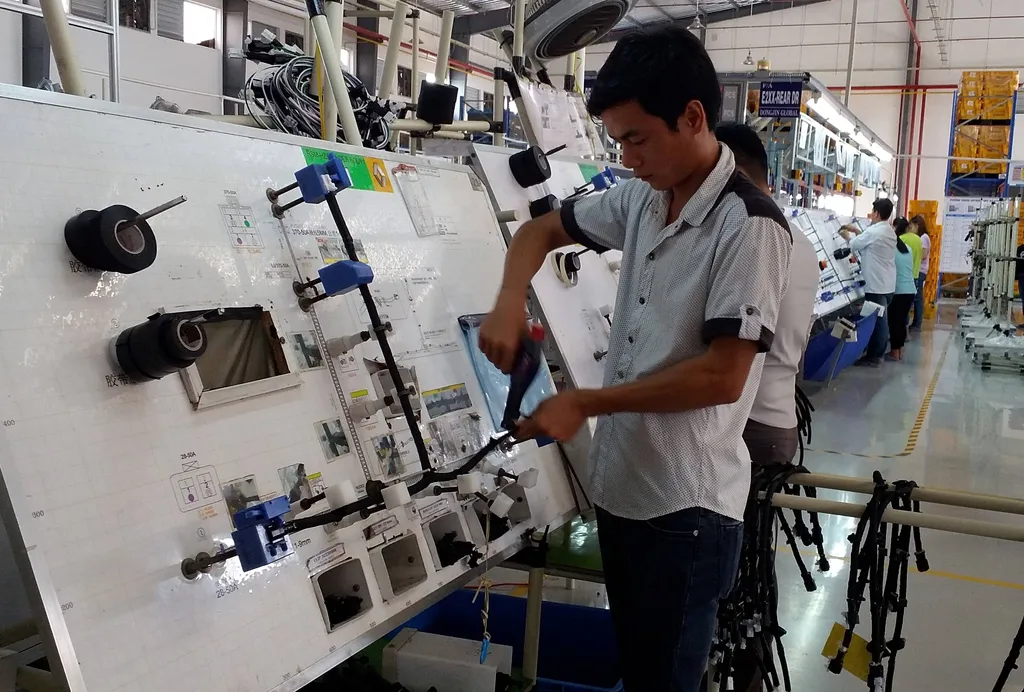 |
| Production of automobile electric cables at Dongjin Global Co, Ltd. Vietnamese supporting industries find it difficult to enter the global supply chain. — VNA/VNS Photo |
Linkage with multinational corporations is the shortest way for Vietnamese supporting industry enterprises to participate in the global supply chain, according to economic experts.
Global production supply chains are led by multinational corporations and domestic enterprises must cooperate with those companies to join the chains, the experts said.
According to the Việt Nam Electronic Industry Association (VEIA), Việt Nam has welcomed many foreign direct investment (FDI) enterprises requesting support in connecting and building supply chains, including leading enterprises from Europe, America or a series of Apple’s tier 1 suppliers.
The expected chances will help Vietnamese enterprises develop and become a member of the global value chain with hi-tech products having high added value.
However, Phạm Tuấn Anh, deputy director of the Department of Industry (MoIT), said that Vietnamese supporting industry enterprises still found it difficult to enter global supply chains. The connection between FDI enterprises and domestic enterprises was still loose.
In addition the competitiveness, organisational and management capacity and technological level of most Vietnamese enterprises were still low to meet the strict requirements and standards of multinational corporations.
To participate more deeply in the global supply chain, Việt Nam’s supporting industry needed to promote linkages and the stability of the supply chain for Việt Nam’s key manufacturing industries such as textiles, footwear and electronics.
Along with that, it iwas necessary to perfect the system of institutions, policies and legal documents as a foundation for industrial development.
The Ministry of Industry and Trade also stated that the level of links and business cooperation between enterprises in the same industry and between different industries was still limited.
The tie-ups between FDI enterprises and domestic enterprises were still slow, so it had not promoted the development of management skills, technology transfer and the formation of material supply chains. The participation of domestic enterprises in global production and supply chains had not been enhanced.
So, the cooperation with FDI enterprises, large domestic and foreign industrial production enterprises and international organisations should be maintained, to promote links with domestic enterprises and improve the capacity of domestic suppliers. Those would create conditions for Vietnamese supporting industry enterprises to participate in the global value chain.
Trương Thị Chí Bình, chairwoman of the Việt Nam Supporting Industry Association, said now was the time to have more investment in the domestic supporting industry sector. When working with large foreign partners, they set very high requirements for production lines.
However, this investment for small and medium enterprises was still extremely difficult, they needed support in terms of loan interest rates and it was the biggest concern for the enterprises.
Bình said localities could have support in investment and interest rates for the businesses producing supporting industrial products, instead of just waiting for the Government’s policies.
In addition, she said the enterprises needed to negotiate with FDI companies to prepare for production of supporting industry products. That could avoid the situation that FDI companies entering Việt Nam together with their available supply chain.
The businesses also needed to promote the application of digital technology in production to improve productivity and competitiveness.
It was necessary to strengthen the connection of domestic enterprises with the FDI firms and the global market to take opportunities from free trade agreements, bringing domestic supporting industry enterprises deeper into the global value chain.
The MoIT report shows that a number of domestic supporting industry enterprises have improved their production productivity and efficiency and cut costs to help improve competitiveness. They become direct suppliers to manufacturers and assemblers of finished products and multinational corporations, participating in regional and global production networks and value chains.
The domestic supporting industry has been developing to supply raw materials for domestic production, leading to increase in localisation rate of many manufacturing industries such as the textile and footwear industry (45-50 per cent) and mechanical engineering (more than 30 per cent).
However, the ministry has also found that the effectiveness of implementing incentive policies is still limited because the production capacity of Vietnamese enterprises has not met what can be quite strict conditions in order to enjoy incentive policies.
A number of supporting industry enterprises have not paid attention to preferential and support policies, or have limited human resources, so they have no specialised department to update preferential policies. — VNS
- Reduce Hair Loss with PURA D’OR Gold Label Shampoo
- Castor Oil Has Made a “Huge” Difference With Hair and Brow Growth
- Excessive hair loss in men: Signs of illness that cannot be subjective
- Dịch Vụ SEO Website ở Los Angeles, CA: đưa trang web doanh nghiệp bạn lên top Google
- Nails Salon Sierra Madre
 VnExpress News The News Gateway of Vietnam
VnExpress News The News Gateway of Vietnam




